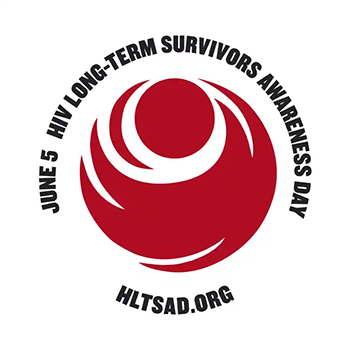HIV Long-Term Survivors Day
Leading with Legacy
HIV Long-Term Survivors Awareness Day (HLTSAD) honors long-term survivors of HIV and increases visibility of their needs, health issues, and journeys. The annual observance on June 5 coincides with the anniversary of the first reported cases of what later became known as AIDS.
HIV long-term survivors include several groups:
- People who have had HIV for 10 years or longer
- Adults with HIV who acquired the virus perinatally during or soon after birth
- People who were diagnosed with HIV before the availability of antiretroviral therapy (ART) in 1996.
With decades of successful HIV research and new treatments, people with HIV are living longer, resulting in a growing population of long-term survivors. This population may experience complications associated with long-term exposure to the virus, the toxicity of many early HIV treatments that caused life-altering side effects, and long-term ART use. HLTSAD encourages advocates to support efforts to improve quality of life for long-term survivors with HIV.
The National Institutes of Health (NIH) HIV research program, coordinated by the NIH Office of AIDS Research (OAR), supports research to better understand comorbidities, or other conditions that occur along with HIV, in long-term survivors and people aging with HIV. OAR launched the HIV and Aging Signature Program in 2022 to advance research aimed at improving the health of people with HIV experiencing comorbidities such as neurocognitive decline, cardiovascular disease, and some cancers. This includes long-term survivors of HIV, who may be young, but who still face effects of long-term exposure to the virus and ART. The signature program has brought together people with HIV, researchers, and federal partners to work together to identify ways to improve health of older adults and long-term survivors with HIV.

Additional Resources
NIH Office of AIDS Research (OAR)
- FY 2021-2025 NIH Strategic Plan for HIV and HIV-Related Research provides a roadmap for NIH to guide HIV and HIV-related research and directs HIV research funding to the highest-priority areas to help end HIV.
- OAR helps identify and catalyze research to address the needs of people aging with HIV, including long-term survivors. Learn more in this OAR Director’s Blog.
- HIVinfo.NIH.gov, maintained by OAR, provides HIV-related infographics, fact sheets, and links to additional resources. These include resources on long-term survival with HIV:
- HIV and Older People (Fact Sheet)
- The Living with HIV and AIDS and Older Adults HIV Source collections provide resources on topics like housing, mental health, and how to stay healthy with HIV from federal and nonfederal sources.
Additional Information and Resources
- Learn more about living with HIV long-term at the official HIV Long-Term Survivors Day webpage.
- HIV.gov provides information on the U.S. government’s HIV response. Check out the HIV.gov HIV Long-Term Survivors Awareness Day webpage and Aging with HIV webpage to learn more.
